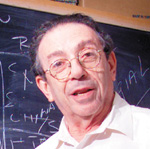 Syllabus
Syllabus
In building Losers around
“forgotten” thinkers—19th- and early-20th-century
writers “who, for the most part, view reason as the
enemy of truth or at least as false reed on which we cannot
depend”—Bernard Silberman encountered a not-altogether-unexpected
problem. Forgotten thinkers aren’t always still in
print.
Several thinkers got the ax because of
that, although Georges Sorel’s Reflections on
Violence was put on the list and on reserve.
 Photo by Jason
Smith
Photo by Jason
Smith |
| Bernard Silberman |
Silberman chose writers and works that
were influential in their own time and whose influence “has
persisted even if it is only indirectly.” High on
the list was L. Frank Baum’s The Wonderful Wizard
of Oz, “a complex text” rarely discussed
despite its fame, along with several other household names
(in bookish households): William James, Pragmatism;
Marcus Garvey, Life and Lessons; Friedrich Schiller,
Essays; and Herbert Spencer, Political Writings.
Rounding out the readings were Henri Bergson, Creative
Evolution; Rosa Luxemburg, Rosa Luxemburg Speaks;
and the course opener, Joseph de Maistre, Considerations
on France.
Limited to undergrads, the course required
two-page papers on each of the nine texts—“something
in your own words as to what you think are the important
points of the reading.”
On the take-home final students chose
three of eight questions, with each answer limited to three
typewritten pages (“You may use any source you can
lay your hands on, but you must cite your sources,”
Silberman warned). Here is Question No. 8: “A number
of writers hold theories that explain or imply that the
emergence of institutions is the result of individual choices.
Certainly Spencer is one of these. Who else might belong
to this group? Explain why Spencer and the others qualify
as methodological individualists.”
—M.R.Y.


![]() Advertising
Advertising
![]() About
the Magazine
About
the Magazine ![]() Alumni
Alumni
![]() UChicago
UChicago
![]()
![]() ©2003 The University
of Chicago® Magazine
©2003 The University
of Chicago® Magazine ![]() 5801 South Ellis Ave., Chicago, IL 60637
5801 South Ellis Ave., Chicago, IL 60637![]() fax: 773/702-0495
fax: 773/702-0495 ![]() uchicago-magazine@uchicago.edu
uchicago-magazine@uchicago.edu
